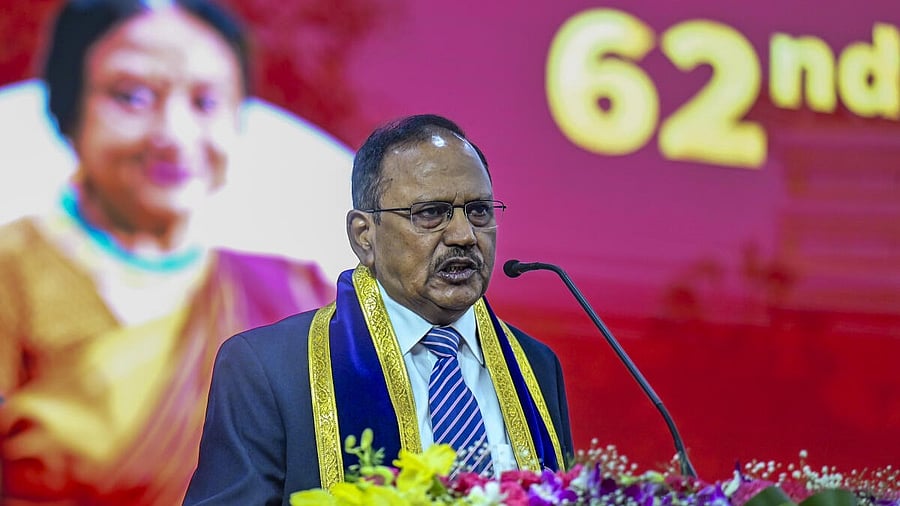
Ajit Doval at IIT Madras convocation
Credit: PTI photo
Chennai: Operation Sindoor hit nine terror bases crisscrossing Pakistan with precision, missing none, National Security Advisor Ajit Doval said here on Friday, challenging Pakistan’s claims of substantial damage to India by demanding “one photograph or satellite imagery” showing even a “broken glass pane” in the country.
In his first public comments on India’s military strikes against Pakistan following the Pahalgam terrorist attack in Jammu and Kashmir, Doval expressed pride in India’s capabilities and technological prowess in countering cross-border threats, especially during the May operations.
“We have to develop our indigenous technology. Operation Sindoor was mentioned here, and we are truly proud of it -- not necessarily for what people perceive, but for the significant indigenous content involved. We are proud of some of the best systems that worked,” Doval said, addressing the 62nd convocation of the Indian Institute of Technology Madras (IIT-M).
Doval highlighted India’s pride in indigenous technologies such as BrahMos missiles, radars, integrated air control and command systems, and other battlefield surveillance technologies.
“We targeted nine terrorist locations across Pakistan, not just near border areas. We missed none. We hit only those targets and nowhere else. The operation was so precise that we knew exactly who was where. The entire operation took just 23 minutes,” Doval said, reiterating India’s position that only terror targets were struck.
He criticized the international media for amplifying Pakistan’s claims about damage in India. “Foreign press said Pakistan did this and that. Show me one photograph, one satellite image -- which nowadays are available globally -- that shows any damage to India, even a broken glass pane,” he asserted.
Singling out The New York Times, Doval said the images published by foreign media only showed 13 air bases in Pakistan before and after May 10, whether in Sargodha, Rahim Yar Khan, Chaklala, or Rawalpindi.
“I am only telling you what foreign media published based on images. We are capable of causing damage to Pakistani air bases,” he added.
Speaking about artificial intelligence and 5G, Doval noted that China took 12 years and spent about USD 300 billion developing 5G, while India had neither the money nor the time.
“That’s when we turned to IIT-M’s director Kamakoti and funded their 5G testbed. We wanted trusted sources and a system developed jointly with the private sector. Within about two and a half years, India’s 5G became totally indigenous, with no foreign components. We owe it to your IIT, our private sector, and others,” he said.
Doval said India is progressing rapidly and may become one of the world’s fastest-growing economies next year. He added that if India wants to lead the world, it must embrace and lead in AI, quantum computing, space technology, among others.
“When we complete 100 years of independence, you will be in the prime of your careers; India may then have a GDP exceeding USD 30 trillion, a per capita income of around USD 22,000, and a working population of 1.1 billion,” he noted.
IIT-M Director V Kamakoti announced that the institute will establish a semiconductor fabrication (Fab) facility in the next few months.